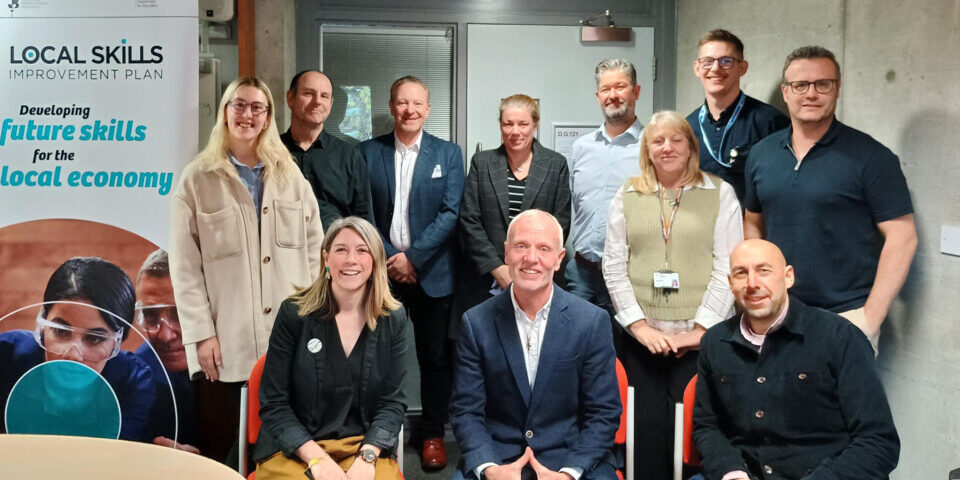Digital Skills Roundtable
Artificial Intelligence has the potential to create jobs rather than take them away, a leading academic has claimed at a West & North Yorkshire Chamber of Commerce event.
John Harrison, Associate at Yorkshire Universities, gave some insight from their recent AI report. John talked about how AI can help to create more jobs, rather than take them away. For example, when society switched from horse and cart to the car there was huge fear of change however far more jobs were created, although they differed, i.e. less farriers, more mechanics.
There is a need to embrace new technologies in the same way. It is anticipated that rather than taking jobs, AI can instead increase capacity and help to business to expand and have more reach. The challenge for employers is then about how to reprofile the existing workforce.
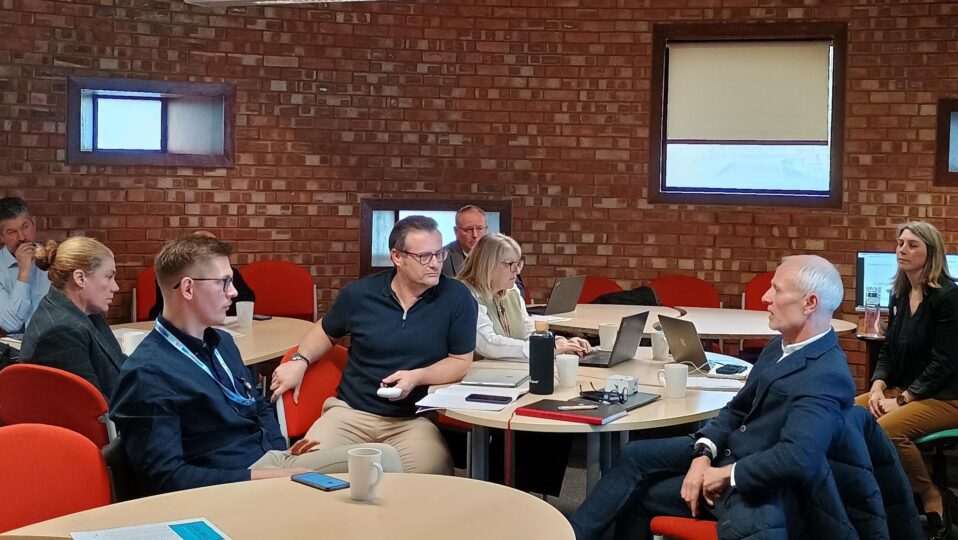
The remarks were made at an event led by the Yorkshire & Humber Institute of Technology at a Digital and Technology Skills Round Table, hosted by West and North Yorkshire Chamber at York St John University.
Attendees included University of York, Urban Spark, NCFE, York College, Network Rail, Youth Work Unit, Garthwest Packaging and POS and Yorkshire Universities.
Lindsey West of Garthwest Packaging and POS, who is also studying as a learner at Hull University on the AI in Leadership course, gave an informative presentation about the sector, which is changing at pace.
Key areas of focus include AI, spatial computing (including areas like augmented reality), robotics, automation and supercomputing.
Insights included:
- Spatial computing is helping to unlock efficiency and innovation.
- Other considerations include:
- Cyber threats
- Use of data
- Changing the way businesses works
- Other roles and life impact, e.g. sport performance analytics, healthcare – such as training surgeons
- A diverse region: We have a diverse region that includes advanced manufacturing, start-ups and digital and creative. There are over 500,000 businesses.
- Growth depends on attracting and retaining talent: The recent white paper reinforces the importance of technical talent and connecting with businesses.
Lindsay emphasised how technology is moving at pace, with people spending around 55% of their time online. He suggested that we can either create with technology or consume it and that looking at future technology can allow us to re-work the way we do things. Lindsay suggested that we need more learners into technology and coding, and that video games are an effective way to engage young people into training in tech. He suggested we are currently standing at ‘A Smart Phone moment’ again, but this time it is bigger. Technology changes everything and the velocity of current change is exponential. “We don’t know where developments are going at the moment, but we do need to stay at the forefront of developments”.
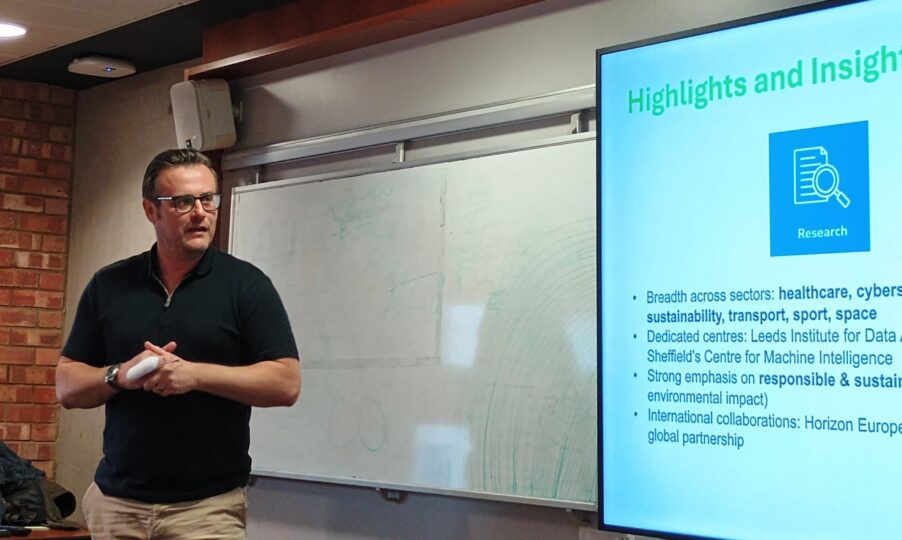
The next Generation: Lindsay spoke about the next generation, who have been born and raised with the smart phone. They are both digitally native and digitally expectant. They expect to engage with technology in education, in their environment and in the workplace. Much of what they learn they can find online and so education needs evolve to reflect this.
The Human in the Room: Tech should help, not control and we can learn from the pitfalls in social media. As a nation it is essential that we invest and have our finger on the pulse to control what is going on. We can’t stand still. Also, increasingly digital and physical technologies are merging, for example the electric car.
The future classroom: It is important that education leans forward rather than hold back, for example using VR etc in the classroom. Other parts of the world are moving forwards, for example Saudi Arabia have far greater technology in the classroom.
Next year will see generation Alpha coming into the workplace, who are the most educated in technology and the most connected of all generations. They are highly reliant on technology and especially AI. However, there will potentially be 5 generations of people in the workplace, all with different levels of technology adoption.

Globalisation: Brings with it both increased opportunity and increased competition. We have the talent to create and lead in tech, not just to consume it but we must develop the right talent and continue to lead. This needs investment, for example Saudi Arabia has recently invested £1.5 trillion.
2025 has been a big year for changes in policy, both in terms of costs for employers, but also in emboldening skills even more.
Universities are now developing and delivering AI courses at undergraduate and postgraduate level. There is also integration of AI courses across all disciplines.
Generative AI is being embedded into teaching and assessment with a balance of maintaining academic rigor. This includes continued professional development (CPD), modular delivery and skill accelerators for SMEs and public sector partners.
There is a need to look at provision and programmes to move learners to become AI natives, with consideration needed for both student and business expectations around this. And we need to understand what higher level skills in AI actually means.
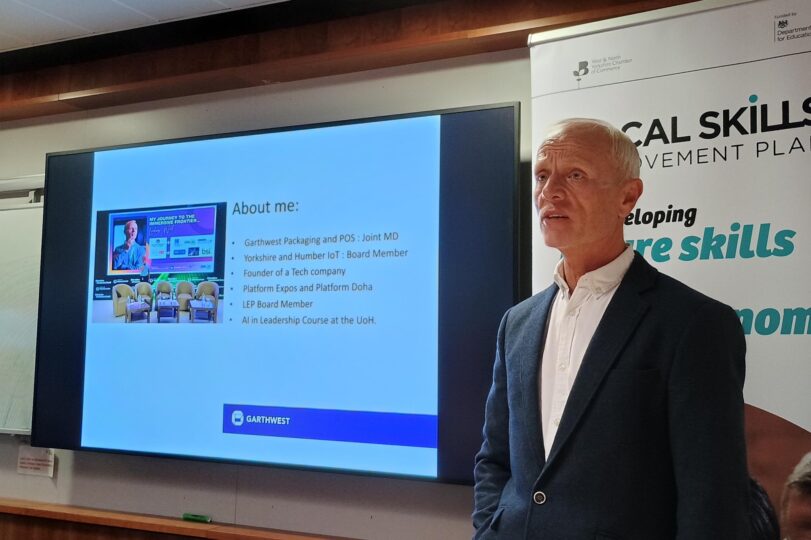
Research is taking place around use of AI, especially around healthcare, to feed into the NHS 10-year plan, cybersecurity, manufacturing, sustainability, transport, sport and space.
There are dedicated AI centres across the Yorkshire and Humber region, including:
- Leeds Institute for Data Analytics
- University of Hull Centre of Excellence for Data Science, Artificial Intelligence and Modelling
- University of Sheffield Centre for Machine Intelligence
Also, there is a strong emphasis on responsible and sustainable AI, including ethics, fairness and environment.
Innovation is happening at pace, such Hull’s DAIM Centre working with SMEs that are looking to conceptualise and model blue sky thinking.
Urban Spark who attended the discussion described how it was easier to upskill young people in tech as digital skills are almost inherent. However, recruiting for specialist jobs in the sector is often challenging. They said they struggle to recruit to sales roles and for the more challenging roles within the sector.
The issue of candidates using AI to support them in doing job applications was also discussed, as many have similar content, so individuality was advised to stand out from the crowd.
Network Rail highlighted the lack of basic Microsoft skills in many younger applicants as well and that really school leavers should already be empowered with these. They can be easily delivered by Microsoft through their online learning platform.
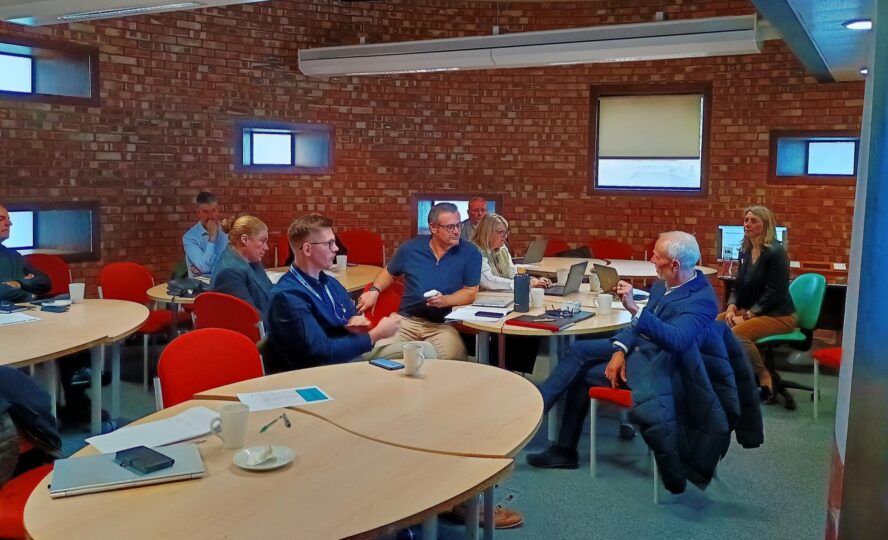
Network Rail are currently working through the process of how to upskill their current workforce in digital skills as the nature of work changes.
They also emphasised the need for candidates and employees with good attitude, flexibility, a growth mindset and adaptability. Saying that employees need to:
- Avoid being risk averse
- Upskill with technical knowledge
- Learn how to use AI to increase productivity
- Develop their soft skills too, for example apprentices with previous work experience tend to do better and they need the soft skills and creative challenge skills
Digital Jobs in York and North Yorkshire are valuable and play a crucial role in the region’s economic growth. There are over 130,000 people employed in digital, creative and technology industries across the region. These industries contribute billions of pounds to the regional economy.


